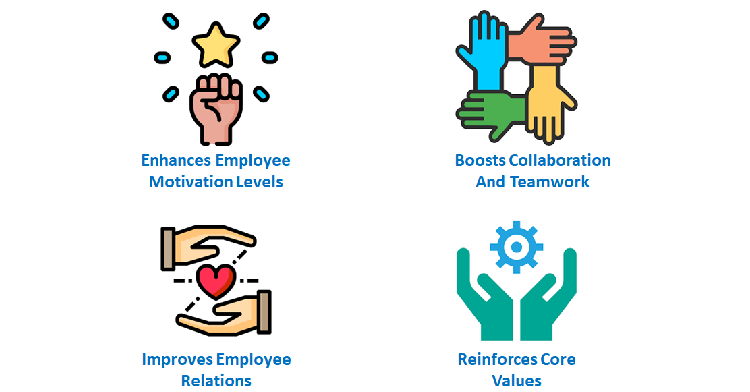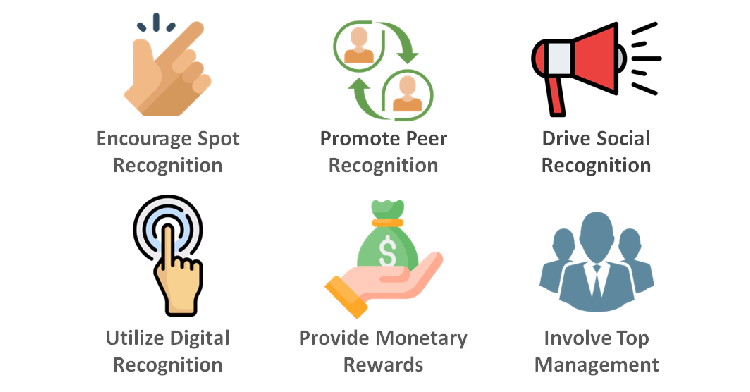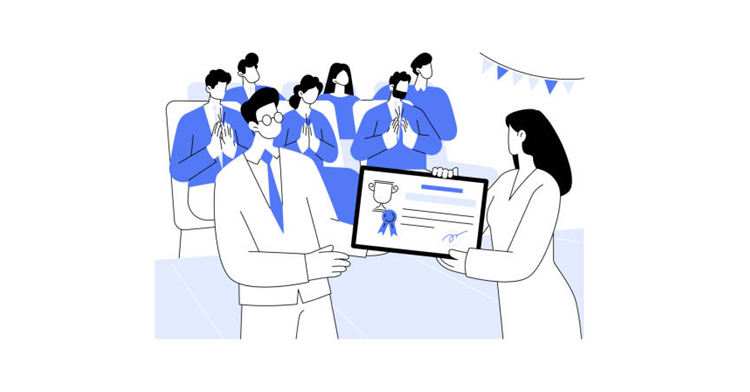1. Enhances Motivation and Reinforces Values: Employee recognition boosts motivation and aligns behavior with organizational core values, fostering a positive work culture.
2. Enhances Teamwork and Employee Relations: Recognizing employees both individually and collectively strengthens teamwork, trust, and camaraderie, promoting collaboration toward shared goals.
3. Promotes a Positive Work Environment: Practices such as spot recognition, peer-to-peer appreciation, and social recognition foster a culture of appreciation, thereby reducing negativity and enhancing employee satisfaction.
4. Leverage Leadership and Digital Tools: Involving top management and using digital recognition platforms ensures timely and widespread recognition, reinforcing a culture that values employee contributions.
One of the most important factors that employees consider when deciding where to work is the organization’s culture. Integrating employee recognition with the organizational culture can make the organization attractive to prospective employees and help retain top talent.

Organizational culture is the umbrella term used to define the core values, beliefs, work environment, and workforce behaviors of an organization.
Various factors profoundly influence the organizational culture, including company size, industry, national cultures and traditions, economic trends, and even international trade.

It also manifests in various ways, from how business decisions are made and implemented to the way employees work and interact with customers and one another.
A Workhuman Survey Report found that in organizations having a values-based recognition program, employees are much more likely to embrace the core values and behave accordingly. On the other hand, when there’s no recognition program at all, employees are much more likely to not even be aware of the core values.
A good organizational culture is critical as it impacts almost every aspect of the business.

In addition to influencing employee performance and productivity, the culture has a lasting impact on hiring and retention, as well as goodwill and profitability.
Importantly, organizational culture is decisive in defining the organization’s ideology and business practices.
Employee recognition is one of the key contributors to building a great and progressive organizational culture.
When organizations reward and recognize employees for their hard work and desirable behavior, they establish the foundation for a culture of appreciation.
Most importantly, rewards and recognition impact different aspects of the workforce, which helps in strengthening organizational culture:
1. Enhances Employee Motivation Levels
2. Boosts Collaboration And Teamwork
3. Improves Employee Relations
4. Reinforces Core Values


Spot awards and other forms of recognition play a crucial role in motivating employees.
It assures the employees that their efforts and contributions are well appreciated and valued. This gives employees a sense of pride and contentment.
Hence, they are inspired to continue their excellent work and behavior.
It helps in creating a positive organizational culture.

Also, recognizing employees collectively for their contribution to the business helps boost their sense of teamwork.
Hence, team awards and recognition help in strengthening their sense of belonging to the team and the organization.
Therefore, it encourages employees to cooperate and coordinate with their co-workers to achieve their business goals.

Additionally, rewards and recognition help to improve employee relations and help build a solid organizational culture.
Both manager and peer-to-peer recognition help enhance trust and camaraderie between members of the workforce.
Therefore, it eliminates negative sentiments and enables them to work with their supervisors and peers toward common business goals.

Additionally, rewards and recognition can help foster positive behaviors within the organization.
It motivates them to integrate the core values and ethics of the organization into day-to-day work and behavior.
Hence, this helps in building the desired culture across the organization.
A pioneering brand in the radio space with a network across 30 cities, owned by a large media conglomerate is leveraging the HiFives platform to run its peer-to-peer recognition program based on the company core values across its workforce, comprising of radio jockeys, programming staff, sales and marketing personnel and other functional staff.
An employee rewards and recognition program has a profound and lasting impact on the organizational culture.
Hence, organizations must understand the most effective ways to leverage recognition in building culture.
Here are six best practices that can prove helpful for organizations:
1. Encourage Spot Recognition
2. Promote Peer-to-Peer Recognition
3. Drive Social Recognition
4. Utilize Digital Recognition Platforms
5. Provide Monetary Rewards
6. Involve The Top Management


Encouraging managers and supervisors to recognize employees on the spot for their excellent work and behavior can go a long way in creating a positive organizational culture.
It ensures that the employees do not have to wait weeks or even months before they are appreciated for their efforts.
At the same time, it inspires other employees to push up their performance levels. Hence, spot recognition assures employees that their organizations value them.

Promoting peer-to-peer recognition is another effective way of building an excellent organizational culture.
This empowers employees to appreciate and recognize their co-workers publicly. It helps build trust and improves coordination among the members of the workforce.
Most importantly, peer-to-peer recognition helps minimize cynicism, jealousy, and brooding among employees.
Hence, it helps create an atmosphere of happiness and contentment at the workplace.

Organizations should not overlook the importance of social recognition in fostering a strong organizational culture.
Social recognition helps to highlight the efforts and achievements of employees across the organization.
Social recognition can take various forms, including in-person or virtual award ceremonies, as well as simply acknowledging employees during team meetings or other gatherings.

Integrating digital recognition into the organization’s everyday work also helps promote a positive organizational culture.
Digital recognition strategies may include sending ‘thank you’ notes instantly through messengers, appreciation e-mails, and the use of employee recognition software.
Importantly, these methods allow instant recognition regardless of the time of day or the employee’s location.
Additionally, digital recognition helps simplify and streamline the entire process.

As part of the employee recognition program, monetary awards can play a significant role in fostering a robust organizational culture.
Employees tend to feel motivated by such rewards for a longer time. It also becomes aspirational for other employees to emulate such performance and behavior.
It creates a virtuous cycle that strengthens the organizational culture.

Ultimately, organizations must ensure that top management is actively involved in employee recognition programs.
Their participation in the program creates a more profound and longer-lasting impact.
Therefore, it assures the employees that the top management is willing to invest their time and effort in recognizing their good work.
It, in turn, helps in building a solid organizational culture.
Integrating employee recognition with organizational culture can provide a major competitive advantage to organizations. It can help them build a motivated and committed workforce that can drive business growth. It also enables them to attract and retain top talent.

Lead author: Sagar Chaudhuri, the Co-Founder and CEO of HiFives. He is an HR Tech Evangelist with over 25 years of experience in both corporate and entrepreneurial settings. Previously, Sagar has held leadership roles with companies such as Genpact, Infosys, and ICICI Bank. He has an engineering degree from IIT Kharagpur and an MBA from IIM Lucknow. Connect on LinkedIn
To stay updated on the latest HiFives blogs, follow us on Twitter (@MyHiFives)